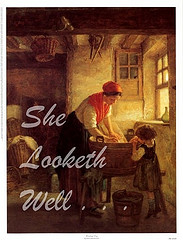What will now emerge clearly from Genesis 2 is that male-female equality does not constitute an undifferentiated sameness. Male and female are equal as God's image-bearers. They are spiritually equal, which is quite sufficient a basis for mutual respect between the sexes. But the very fact that God created human beings in the dual modality of male and female cautions us against an unqualified equation of the two sexes. This profound and beautiful distinction, which some belittle as "a matter of mere anatomy," is not a biological triviality or accident. It is God who wants men to be men and women to be women, and He can teach us the meaning of each, if we want to be taught. We ourselves can feel intuitively the importance of distinct sexual identity when we see, for example, a transvestite. A man trying to be a woman repulses us, and rightly so. We know that this is perverse. Sexual confusion is a significant, not a slight, personal problem, because our distinct sexual identity defines who we are and why we are here and how God calls us to serve Him.
God has no intention of blurring sexual distinctness in the interests of equality in an unqualified sense. In fact, there are many areas of life in which God has no intention of leveling out the distinction between us. Consider the obvious: God does not value intellectual or aesthetic equality among people. He does not value equality in finances, talents, and opportunity. . . . Because God is ultimately the One who shapes our lives, I have to conclude that God is not interested in unlimited equality among us. And because God is also wise, I further conclude that unlimited equality must be a false ideal. But the Bible does teach the equal personhood and value and dignity of all the human race-men, women, and children-and that must be the only equality that matters to God. One measure of our wisdom as God's image-bearers is whether we share this perspective with God. One measure of our reconciliation with God is whether His sovereign decrees draw from us a response of worship or resentment.
. . .
On the other side of the paradox, the woman is the man's helper. The man was not created to help the woman, but the reverse. Doesn't this striking fact suggest that manhood and womanhood are distinct and non-reversible? Doesn't this make sense if we allow that, while the man and the woman are to love each other as equals, they are not to love each other in the same way? The man is to love his wife by accepting the primary responsibility for making their partnership a platform displaying God's glory, and the woman is to love her husband by supporting him in that godly undertaking.
It is the word "helper" that suggests the woman's supportive role. Spencer [evangelical feminist] argues, however, that this description of Eve "does not at all imply inherent subordination." She adduces the fact that God Himself is portrayed in Scripture as our "Helper, " which He is. She then interprets this fact: "If being 'one who helps' inherently implies subordination, then, in that case, God would be subordinate to humans!" This reasoning is not really fallacious. The fallacy lies in the implication of what she says, namely, that God cannot be subordinate to human beings. It is entirely possible for God to subordinate Himself, in a certain sense, to human beings. He does so whenever He undertakes to help us. He does not "un-God" Himself in helping us; but He does stoop to our needs. according to His gracious and sovereign will.
When He helps His people, He retains His glorious deity but (amazingly!) steps into the servant role, under us, to lift us up. he is the God who emptied Himself and came down to our level-below us, to the level of slavery-to help us supremely at the cross. Therefore, the fact that the Old Testament portrays God as our Helper proves only that the helper role is a glorious one, worthy even of the Almighty. This Biblical fact does not prove that the concept of helper excludes subordination. Subordination is entailed in the very nature of a helping role.












No comments:
Post a Comment